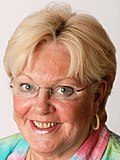| |||||||||||||||||||||||||||||||||||||||||||||||
Constituency of Glasgow Govan | |||||||||||||||||||||||||||||||||||||||||||||||
|---|---|---|---|---|---|---|---|---|---|---|---|---|---|---|---|---|---|---|---|---|---|---|---|---|---|---|---|---|---|---|---|---|---|---|---|---|---|---|---|---|---|---|---|---|---|---|---|
| |||||||||||||||||||||||||||||||||||||||||||||||
| |||||||||||||||||||||||||||||||||||||||||||||||
| This article is part of a series within the Politics of the United Kingdom on the |
| Politics of Scotland |
|---|
 |
The 1973 Glasgow Govan by-election was held on 8 November 1973,[1] following the death of John Rankin, Labour Party Member of Parliament for the Glasgow Govan constituency. Rankin had died one month earlier, on 8 October 1973. Rankin had held the seat since 1955. With the exception of a narrow Conservative victory in 1950, the seat had been solidly Labour-held since 1918. For the by-election the Labour Party nominated Harry Selby, a veteran activist in Glasgow and a former Trotskyist. It was later reported that Selby's selection had been controversial with some Labour members who felt that at the age of 61 he was too old to be starting a parliamentary career.[2]
The Conservative Party, long the main opposition in the constituency, nominated John Mair, but as they were in mid-term government, they expected little from the election. Party support had also suffered after refusing the important local employer Upper Clyde Shipbuilders a government loan to continue operations.
The Scottish National Party (SNP) had barely won 10% of the vote in the constituency at the 1970 general election. Nonetheless, nationalist sentiment had increased following the discovery of North Sea oil, and the party had performed very well in the 1971 Stirling and Falkirk by-election, and the 1973 Dundee East by-election. The SNP nominated the young teacher Margo MacDonald.
The Liberal Party, despite having held the constituency for considerable periods prior to 1918, had little base in Glasgow and had not even contested it in 1970. They stood Peter McMillan. The withdrawal of the Liberal Party allowed the Communist Party of Great Britain to poll fourth in 1970, with only 326 votes. With such a low count, they chose not to contest the 1973 by-election.
- ^ http://www.alba.org.uk/timeline/1967to1979.html Archived 9 July 2011 at the Wayback Machine alba.org.uk
- ^ Clark, William (10 November 1973). "SNP celebrate their new status in parliament". The Glasgow Herald. Retrieved 22 April 2021.
